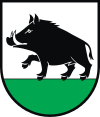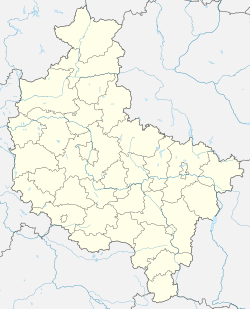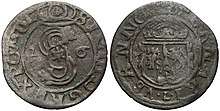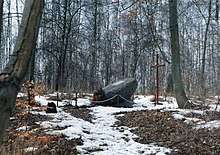Łobżenica
Łobżenica [wɔbʐɛˈɲit͡sa] (German: Lobsens) is a town in Piła County, Greater Poland Voivodeship, Poland, with 3,211 inhabitants (2004).
Łobżenica | |
|---|---|
Historic gasworks (now a shop) and water tower in Łobżenica | |
 Flag  Coat of arms | |
 Łobżenica  Łobżenica | |
| Coordinates: 53°16′N 17°15′E | |
| Country | |
| Voivodeship | Greater Poland |
| County | Piła |
| Gmina | Łobżenica |
| Town rights | before 1438 |
| Area | |
| • Total | 3.25 km2 (1.25 sq mi) |
| Elevation | 100 m (300 ft) |
| Population (2006) | |
| • Total | 3,172 |
| • Density | 980/km2 (2,500/sq mi) |
| Time zone | UTC+1 (CET) |
| • Summer (DST) | UTC+2 (CEST) |
| Postal code | 89-310 |
| Website | http://www.lobzenica.pl |
History

Łobżenica dates back to the 11th century.[1] It prospered due to its location between Gdańsk Pomerania and central Poland.[1] It was granted town rights before 1438, most likely in the 14th century by King Władysław I Łokietek or Casimir III the Great of the Piast dynasty.[1] Łobżenica was a private town located in the Kalisz Voivodeship in the Greater Poland Province of the Polish Crown. It was ravaged by the Teutonic Knights in 1431 and 1457.[1] The town prospered thanks to crafts, brewing and trade. Local merchants participated in trade with large Polish cities of Poznań, Bydgoszcz, Toruń and Gdańsk, as well as other nearby towns.[1] In 1606, Scottish merchants settled in the town.[1] In the years 1612-1630 a mint operated in Łobżenica.[1] In the 17th century, Łobżenica became a Reformation center under the patronage of the Grudziński family.[1]
After the late 18th century Partitions of Poland, the town was annexed by Prussia. It was reintegrated with Poland, soon after the country regained independence in 1918. After the invasion of Poland, which started World War II, the Germans carried out mass arrests and executions among local Poles in 1939, mainly as part of the Intelligenzaktion, murdering about 200 people in October and November 1939 in the Łobżenica massacre.[2]
Notable people
- Jan Rymarkiewicz (1811–1889), Polish historian, teacher and insurgent
- Wilhelm Arndt (1838-1895), German historian
- Władysław Seyda (1863–1939), Polish lawyer and politician, minister, First President of the Supreme Court of Poland
References
- "Historia Łobżenicy". Urząd Miejski Gminy Łobżenica (in Polish). Retrieved 9 March 2020.
- Maria Wardzyńska, Był rok 1939. Operacja niemieckiej policji bezpieczeństwa w Polsce. Intelligenzaktion, IPN, Warszawa, 2009, p. 163-164 (in Polish)
- "Pogoń Łobżenica - strona klubu" (in Polish). Retrieved 9 May 2020.
